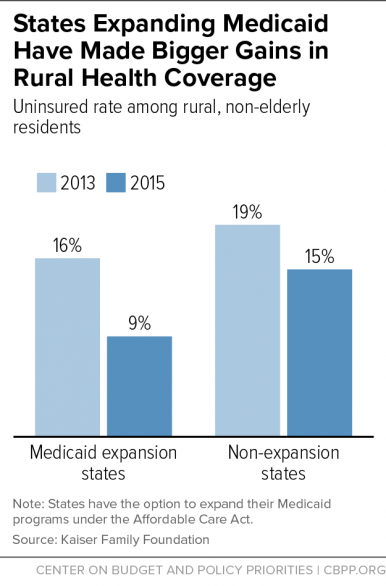New analysis from the national Center on Budget and Policy Priorities (CBPP) demonstrates that the American Health Care Act (AHCA), as passed by the US House of Representatives, would undermine every part of the health care system in rural areas including most of Maine. By rolling back Medicaid expansion, allowing age-based price discrimination by insurers, and allowing states to waive requirements to cover pre-existing conditions, the AHCA threatens the health of tens of thousands of rural Mainers, as well as the finances of Maine hospitals.
The CBPP report shows that Medicaid expansion has particularly benefitted rural residents of the 31 states or territories that have adopted it. Before passage of the Affordable Care Act (ACA), rural Americans, including rural Mainers, were less likely to have health insurance, and more likely to have serious health conditions. Lack of insurance led to poorer care, which created a vicious cycle of rising costs of care and insurance, leading to even less access to care.
The ACA expanded the reach of Medicaid program in rural America to the lowest-earning families including self-employed farmers, fishermen, and contractors, and provided income-based tax credits to offset the higher cost of private insurance coverage for many more. Since passage of the ACA, rural Americans have seen the biggest gains in insurance coverage, and Medicaid expansion states have seen bigger gains than non-expansion states.

Medicaid expansion has also helped rural hospitals, which have long struggled with serving an under-insured population. Uncompensated care costs as a share of all hospital operating budgets fell by about half between 2013 and 2015 in expansion states. These reductions have been even larger for rural hospitals. Average operating margins in expansion states increased by 1% for urban hospitals, but 4% for rural hospitals.
Since 2010, 78 rural hospitals have closed, most of which have been in states which didn’t increase Medicaid coverage. Fully half of Maine’s hospitals operated at a loss in 2016, and many fear the consequences of a repeal of the ACA’s provisions that increased insurance coverage. Thirteen of the state’s largest employers are hospitals, and any layoffs or closures would have serious economic effects, in addition to the reduction in health care availability.
Beyond taking away Maine’s ability to benefit from Medicaid expansion, the AHCA would directly impact rural Mainers’ ability to purchase private health insurance. Most (57%) of the Mainers who buy insurance through Healthcare.gov live in rural areas. For these individuals, the AHCA’s new tax credits for purchasing individual market coverage are greatly inadequate. As MECEP previously showed, the changes to tax credits in the AHCA would result in some rural Mainers paying 1,500% more in premiums. Further hardships would be imposed by the AHCA’s removal of cost-sharing provisions for low-income Americans.
Annual Costs to Rural Mainers using Healthcare.gov
| ACA tax credit | AHCA tax credit | Difference | |
| Average enrollee | $5,592 | $2,957 | -47% |
| ACA premium | AHCA premium | Difference | |
| 60 year-old, income of $22,000 | $1,183 | $10,012 | + $8,829 |
| Net premium increase | Increase via elimination of cost-sharing provisions | Total increase in costs | |
| Average enrollee | $2,928 | $1,086 | $4,014 |
Source: CBPP report
Finally, the House bill gives states and insurers a dangerous amount of discretion to increase prices at the expense of older, sicker Mainers. One provision – which proponents took from Maine’s unsuccessful attempts at pre-ACA reforms – would allow insurers to charge premiums that are five times higher than they charge younger people, based solely on age. Another would allow states to waive the current law that protects people with pre-existing conditions. For rural Maine where heart disease, cancer, and other chronic conditions are particularly prevalent, this provision threatens even larger increases in health care costs.
The American Health Care Act poses a risk to the health and financial well-being of all Americans, but its burdens would fall particularly hard on rural Americans and practitioners in rural areas. In Maine, where health insurance costs are already relatively high and hospitals are struggling to break even, the threats are even greater. Maine’s legislative delegation to Washington must ensure that this harmful legislation is not allowed to wreak havoc on Mainers’ health, pocket-books, and jobs.



